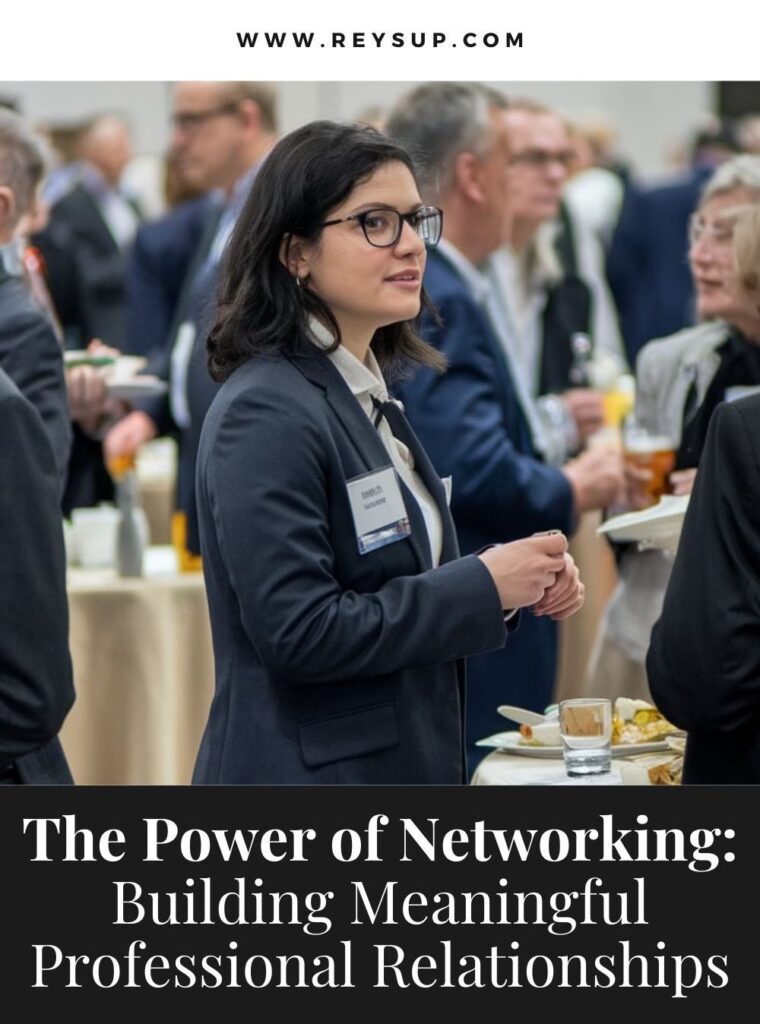The Power of Networking: Building Meaningful Professional Relationships
Have you ever heard the phrase “it’s not what you know, but who you know?”. Well, that phrase could not be more relevant in today’s fast-paced professional world. Whether you’re just kick starting your career or already well established in your field, networking is a critical part of getting ahead and being successful. In fact, building meaningful professional relationships can open doors that your formal education or skill sets can not. Sometimes, you just need someone to open a door for you. In this article, we dive into why networking is important, how it benefits you at any stage of your career, and provide tips on how to approach the various forms of networking you could encounter. Let’s get into it!

Networking: A Critical Component to Career Advancement
Networking is more than a buzzword. It’s a powerful strategy that helps you advance your career in ways that your skills and qualifications alone cannot. Think about it – the relationships that you build could lead to so many things like new career opportunities, mentorship, collaboration, and even friendship. That’s why career professionals who actively network are exposed to a wider range of job opportunities, industry insights and opportunities to fine-tune their craft. By connecting with others, you gain access to knowledge, support, and guidance that can help you make more informed decisions, stay competitive, and grow in your field.
Some people even refer to networking as tapping into a ‘hidden’ job market because it is through these relationships that people find opportunities before they are even advertised online. When you develop professional relationships, people are more likely to recommend you for roles, even if you’re not actively searching. Whether you’re looking for a new job right now or happy in your current role but may be looking in the future, building and nurturing a network can’t hurt. In fact, it’s essential.
Networking at Any Stage of Your Career
One of the most important things to remember about networking is that it’s a good idea to do it no matter where you are in your career. Whether you’re a recent graduate looking for your first job or an executive happy with your current role, maintaining a strong professional network ensures that you’re ready for whatever comes next. And let’s face it, no one knows what is coming next so it’s best to be prepared! Even when you’re content in your position, keeping the door open to new opportunities allows you to pivot quickly if needed.
In fact, the best time to network is actually when you’re not actively looking for a job. Networking without an immediate need allows you to build authentic relationships without the pressure of asking for something in return. A casual conversation at a conference, a LinkedIn connection request, or grabbing coffee with a peer may not immediately lead to a new job or opportunity, but you never know when those connections will pay off in the future. People you meet today could be future colleagues, mentors, or partners.
For example, someone you meet at a networking event may move to a leadership position at a company you’re interested in down the road. They could remember your positive interaction and reach out to you for an opportunity. Even if a conversation doesn’t lead anywhere right away, staying in touch with them keeps you on their radar for future consideration.
Types of Networking: Building Relationships in Different Settings
Networking can take many forms, and the way you approach each situation will vary based on the setting and your goals. Whether it’s formal or informal, in-person or online, your approach really matters. Below we’ll explore the different types of networking you could encounter and we’ll provide examples of what to say and how to present yourself in each scenario.
1. In-Person Networking Events
When people hear ‘networking’, they usually think of the traditional In-person events. While more traditional, these are really events ways to meet new people, exchange ideas, and build authentic connections in your industry. These types of events include conferences, industry seminars, professional development workshops, or even casual meetups.
How to act: At in-person events, first impressions are really important. Approach conversations with confidence but avoid dominating the discussion. Practice active listening, ask thoughtful and insightful questions, and engage with others in a genuine way. Remember, people appreciate feeling heard and valued.
What to say: When introducing yourself, keep it concise and focused on your role, interests, and goals. For example, you could say, “Hi, I’m [Your Name], a marketing specialist at [company]. I’m always interested in learning about innovative strategies in digital marketing. What do you focus on in your role?” This opens the door for a conversation without coming across as too into yourself.
How to show up well: Make sure you dress appropriately for the event! Typically business casual or formal, depending on the setting. If you want more help in this department, make sure to check out our other article here. Also remember to bring business cards or have a way to exchange contact information, and be prepared with a few key talking points about your professional background and goals for the future.
2. Online Networking: LinkedIn and Social Media
In our digital age, online networking has become just as common (and important!) as in-person events. Platforms like LinkedIn allow you to connect with peers in your industry all across the globe, join industry or interest groups, and even follow thought leaders and people you aspire to be. Social media sites like X (formally Twitter) or industry-specific forums are also great places to engage in discussions and build your professional voice.
How to act: When connecting with someone online, remember to personalize your message instead of sending a generic connection request. This shows that you’re genuinely interested in their work or background, and explains why you’d like to connect. Make sure to maintain a professional tone, but definitely also let your personality shine through.
What to say: A good message to send alongside a connection request might read like, “Hi [Name], I noticed we both work in [industry], and I’m really impressed by your recent post on [topic]. I’d love to connect and stay in touch as I’m also passionate about [related topics].” Keep your message brief but specific.
How to show up well: Before you reach out or request a connection, make sure your online profiles are up-to-date and polished. Use a professional profile photo, write a clear and engaging headline, and include relevant details in your bio. Check out our related article here on how to set up a great LinkedIn profile. Also, don’t forget to regularly engage with your network by commenting on their posts, sharing industry news yourself, or writing your own content to showcase your thought leadership.
3. Informal Networking
Not all networking has to happen at formal events or via online platforms. Some of the most valuable connections you will make in your professional career will be made informally through everyday interactions with colleagues, friends, or even clients. These low-pressure situations often allow for more natural relationship building and casual getting to know each other.
How to act: Always try to remain approachable and open to conversations, even in casual settings. Share insights, but also be curious about the other person’s experiences. Remember, your existing colleagues or friends may have valuable connections they can introduce you to, so it’s important to nurture these relationships.
What to say: Be casual about it. You can network informally by mentioning your interests or career goals in passing. For example you can say something like “I’ve been really interested in learning more about data analytics. Do you know anyone working in that field who might be open to chatting?” This opens the door for potential introductions.
How to show up well: Even though it’s more of an informal setting, your attitude and enthusiasm can still leave a lasting impression. Make sure to be authentic and personable, but don’t shy away from mentioning your professional interests or asking for a favor when appropriate.
4. Networking Through Mentorship
Mentorship is another powerful form of networking that allows you to learn from someone more experienced than you while gaining access to their professional network. Whether you’re seeking a mentor or acting as one, this type of networking can provide invaluable support and insights for your career.
How to act: If you yourself are being mentored, make sure to approach the relationship with respect for your mentor’s time and expertise. Be clear about what you hope to gain from the relationship, and demonstrate a willingness to learn. If you’re mentoring someone else, be generous with your advice, but also encourage your mentee to take ownership of their growth.
What to say: If you’re asking someone to be your mentor, a good approach might be, “I admire your career path and the expertise you’ve developed in [specific area]. I’m looking for guidance as I navigate my own career and would love the opportunity to learn from you. Would you be open to connecting on a regular basis?”
How to show up well: Be consistent in your communication and follow through on any advice or recommendations provided by your mentor. Show appreciation for their time and stay proactive. Remember, you are in control of your career, and therefore you should be leading the charge to nurture the relationship, not the other way around.
In Summary: Invest in Relationships for Long-Term Success
Networking – in any form and at any stage of your career – is not only powerful but it’s essential. Whether you’re actively looking for new opportunities or simply wanting to stay connected to your industry, networking helps you stay relevant, informed, and open to new opportunities. By engaging in different types of networking—whether at events, online, informally, or through mentorship—you’ll position yourself for success at every stage of your career. Remember, every connection counts, and even the most casual encounters can lead to meaningful professional outcomes down the road. Good luck!



